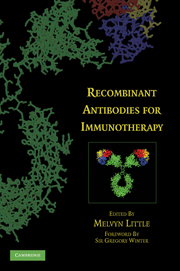Book contents
- Frontmatter
- Contents
- Contributors
- Foreword by Sir Gregory Winter
- Preface
- RECOMBINANT ANTIBODIES FOR IMMUNOTHERAPY
- PART I HUMANIZED ANTIBODIES
- PART II GENERATION AND SCREENING OF ANTIBODY LIBRARIES
- 4 Antibody Libraries from Naïve V Gene Sources
- 5 Antibodies from IgM Libraries
- 6 Generation and Screening of the Synthetic Human Combinatorial Antibody Library HuCAL GOLD
- PART III TRANSGENIC HUMAN ANTIBODY REPERTOIRES
- PART IV ANTIBODY EFFECTOR FUNCTION
- PART V ARMING ANTIBODIES
- PART VI NOVEL ANTIBODY FORMATS
- PART VII ANTIGEN-BINDING REPERTOIRES OF NON-IMMUNOGLOBULIN PROTEINS
- PART VIII PROLONGATION OF SERUM HALF-LIFE
- PART IX INNOVATIVE IMMUNOTHERAPEUTIC APPROACHES
- PART X MARKET OVERVIEW AND OUTLOOK
- Index
- Plate section
- References
6 - Generation and Screening of the Synthetic Human Combinatorial Antibody Library HuCAL GOLD
from PART II - GENERATION AND SCREENING OF ANTIBODY LIBRARIES
Published online by Cambridge University Press: 15 December 2009
- Frontmatter
- Contents
- Contributors
- Foreword by Sir Gregory Winter
- Preface
- RECOMBINANT ANTIBODIES FOR IMMUNOTHERAPY
- PART I HUMANIZED ANTIBODIES
- PART II GENERATION AND SCREENING OF ANTIBODY LIBRARIES
- 4 Antibody Libraries from Naïve V Gene Sources
- 5 Antibodies from IgM Libraries
- 6 Generation and Screening of the Synthetic Human Combinatorial Antibody Library HuCAL GOLD
- PART III TRANSGENIC HUMAN ANTIBODY REPERTOIRES
- PART IV ANTIBODY EFFECTOR FUNCTION
- PART V ARMING ANTIBODIES
- PART VI NOVEL ANTIBODY FORMATS
- PART VII ANTIGEN-BINDING REPERTOIRES OF NON-IMMUNOGLOBULIN PROTEINS
- PART VIII PROLONGATION OF SERUM HALF-LIFE
- PART IX INNOVATIVE IMMUNOTHERAPEUTIC APPROACHES
- PART X MARKET OVERVIEW AND OUTLOOK
- Index
- Plate section
- References
Summary
Nowadays, monoclonal antibodies are the fastest growing class of biopharmaceuticals. By the end of 2007, the U.S. Food and Drug Administration (FDA) had approved 21 therapeutic antibodies. Since 1975, with the seminal work of Köhler and Milstein (Köhler & Milstein,1975) describing the use of hybridoma technology for monoclonal antibody generation, major advances in the field allowed for the development of antibody libraries using recombinant technologies (reviewed by Hoogenboom, 2005, and Sergeeva et al., 2006). Various display technologies and the integration of automated screening methods now enable researchers to quickly identify multiple target specific antibodies for later development as biopharmaceuticals.
This chapter will look at MorphoSys's latest fully human antibody library, the Human Combinatorial Antibody Library HuCAL GOLD based on phage display of Fab antibody fragments. Besides a comprehensive introduction of the design and generation of the library, the chapter will describe the HuCAL-specific CysDisplay technology, explore the use of MorphoSys's proprietary AgX technology, and give some examples on the use of HuCAL-based antibody optimization by using standard affinity maturation approaches or the recently developed RapMAT technology.
HuCAL CONCEPT
The HuCAL technology is a unique and innovative concept for the in vitro generation of highly diverse fully human antibodies. The structural basis for the HuCAL libraries is provided by seven heavy chain and seven light chain variable region genes (Knappik et al., 2000).
- Type
- Chapter
- Information
- Recombinant Antibodies for Immunotherapy , pp. 75 - 86Publisher: Cambridge University PressPrint publication year: 2009

